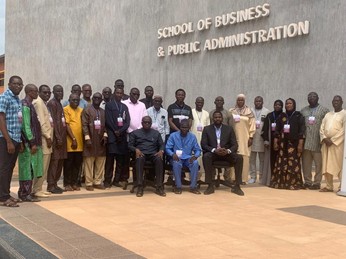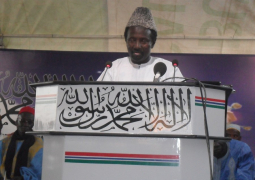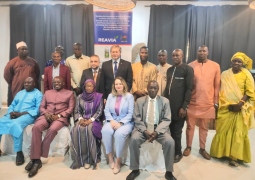
This initiative aims to modernise business education and prepare graduates more effectively for the demands of today’s job market. This partnership is part of the Qatar University Africa Business Education Project and is supported by the Qatar Fund for Development.
In a press conference, the Vice-Chancellor of UTG, Professor Herbert Robinson stated that the project began a year ago, with the goal of reshaping the future of business education in Africa, adding: “We recognize that the business school plays a transformative role. Therefore, this project addresses the high levels of youth unemployment and the need for graduates who possess practical skills and entrepreneurial mindsets.”
The project, he added, focuses on three main components: strategic business planning, curriculum transformation, and research capacity building. The current phase is centered on reviewing the curriculum, with the aim of aligning UTG’s academic programs with national development goals and international standards.
Professor Habib Mahama from Qatar Business School, the lead coordinator of the project, emphasised the importance of producing graduates who can create jobs instead of relying solely on public sector employment. He noted that the private sector is the true engine of growth in African economies, and education must reflect this reality.
The curriculum transformation, he said, aims to address three key elements: knowledge, practical skills, and attitudes.
Professor Mahama explained that these changes would help UTG programs meet the Gambian National Qualification Framework and facilitate international accreditation. “This would make UTG graduates more competitive and mobile, particularly within the West African region.”
“Another significant aspect of the project is the incorporation of sustainable entrepreneurship. The goal is to encourage students to consider not only profit but also the environmental and social impact of their ventures. Plans are also underway to establish incubation hubs to support students and faculty in developing their business ideas into real-world enterprises.”
Dr. Gibriel Badjie, Head of the Department of Management Sciences and Chair of the Curriculum Committee, described the project as essential for institutional visibility and growth. “This transformation will provide us with the leverage to attract international partnerships and define The Gambia through the quality of our graduates,” he remarked.
The pilot phase of the project is expected to last two years. However, both institutions hope that the collaboration will evolve into a long-term partnership with broader benefits for The Gambia and beyond.





